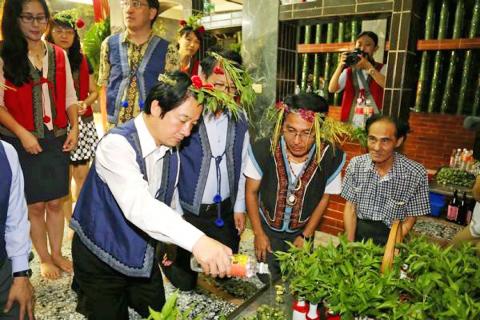The government yesterday approved a proposal to recognize Pingpu Aborigines as indigenous peoples, by amending the Status Act For Indigenous Peoples (原住民身分法) to restore their identity, and linguistic and cultural rights, in accordance with a policy of transitional justice advanced by President Tsai Ing-wen (蔡英文).
The decision to create a new community, known as Pingpu Indigenous People, was announced yesterday by the Executive Yuan following a meeting on policies and status laws regarding Pingpu communities, with deliberations by government officials, academics and representatives of Pingpu communities.
Some Pingpu leaders welcomed the news, hailing it as a “historic decision” for the government to finally recognize Pingpu communities as Taiwanese indigenous peoples, adding that it would open a new era for justice and equality for all the major ethnic and cultural groups in Taiwan.

Photo courtesy of the Tainan City Government
“We are very happy that the Executive Yuan pushed forward on this policy. It is time for Pingpu communities to regain their indigenous status, which they had possessed in the past. On behalf of the Pingpu Siraya community in Tainan City, I want to thank the central government for respecting the right to self-identity and for the recognition of their indigenous status,” Tainan Mayor William Lai (賴清德) said. “This is the first time we have had a positive response from the government on this issue, after decades of struggling and campaigning.”
“However, there is more work to do to promote the cultural identities and traditions of Pingpu communities to restore and protect their rights the same as those of other recognized indigenous peoples,” he added.
Other Pingpu campaigners said that there are still protracted negotiations and hard bargaining to be done with the Council of Indigenous Peoples (CIP) in the years to come, as the proposal requires an itemized examination of the Indigenous Peoples Basic Act (原住民族基本法) on affected rights and applications of Pingpu communities, after the process of amending the Status Act For Indigenous Peoples (原住民身分法).
There has been opposition to the recognition of some Pingpu communities as indigenous peoples to limit their privileges and rights, and government subsidies given to 16 of the recognized Aboriginal groups, activists said.
Pingpu Papora youth campaigner Aidu Mali from central Taiwan said her youth organization has been deliberately excluded from meetings between the Executive Yuan and the CIP over the past year.
“The proposal to create another category as ‘Pingpu Indigenous People’ was not what we fought for. It only gives us a superficial title and we fear that the CIP will work hard to stall on granting any indigenous rights. In the end, we could be denied our rights and excluded from the system again,” she said.
Ketagalan community Pingpu rights campaigner Chen Kimman (陳金萬) said that although he welcomed the development, he also warned that CIP officials, in their own self-interest, had chosen not to grant indigenous status to Pingpu communities, but had deliberately drawn out the process with legal amendments and protracted negotiations, which could drag on for many years and could be impeded by politicians and special-interest groups.

ANOTHER EMERGES: The CWA yesterday said this year’s fourth storm of the typhoon season had formed in the South China Sea, but was not expected to affect Taiwan Tropical Storm Gaemi has intensified slightly as it heads toward Taiwan, where it is expected to affect the country in the coming days, the Central Weather Administration (CWA) said yesterday. As of 8am yesterday, the 120km-radius storm was 800km southeast of Oluanpi (鵝鑾鼻), Taiwan’s southernmost tip, moving at 9kph northwest, the agency said. A sea warning for Gaemi could be issued tonight at the earliest, it said, adding that the storm is projected to be closest to Taiwan on Wednesday or Thursday. Gaemi’s potential effect on Taiwan remains unclear, as that would depend on its direction, radius and intensity, forecasters said. Former Weather Forecast

As COVID-19 cases in Japan have been increasing for 10 consecutive weeks, people should get vaccinated before visiting the nation, the Centers for Disease Control (CDC) said. The centers reported 773 hospitalizations and 124 deaths related to COVID-19 in Taiwan last week. CDC Epidemic Intelligence Center Director Guo Hung-wei (郭宏偉) on Tuesday said the number of weekly COVID-19 cases reported in Japan has been increasing since mid-May and surpassed 55,000 cases from July 8 to July 14. The average number of COVID-19 patients at Japan’s healthcare facilities that week was also 1.39 times that of the week before and KP.3 is the dominant

The Chinese Communist Party’s (CCP) working group for Taiwan-related policies is likely to be upgraded to a committee-level body, a report commissioned by the Mainland Affairs Council (MAC) said. As Chinese President Xi Jinping (習近平) is increasingly likely to upgrade the CCP’s Central Leading Group for Taiwan Affairs, Taiwanese authorities should prepare by researching Xi and the CCP, the report said. At the third plenary session of the 20th Central Committee of the CCP, which ended on Thursday last week, the party set a target of 2029 for the completion of some tasks, meaning that Xi is likely preparing to

US-CHINA TRADE DISPUTE: Despite Beijing’s offer of preferential treatment, the lure of China has dimmed as Taiwanese and international investors move out Japan and the US have become the favored destinations for Taiwanese graduates as China’s attraction has waned over the years, the Ministry of Labor said. According to the ministry’s latest income and employment advisory published this month, 3,215 Taiwanese university graduates from the class of 2020 went to Japan, surpassing for the first time the 2,881 graduates who went to China. A total of 2,300 graduates from the class of 2021 went to the US, compared with the 2,262 who went to China, the document showed. The trend continued for the class of 2023, of whom 1,460 went to Japan, 1,334 went to